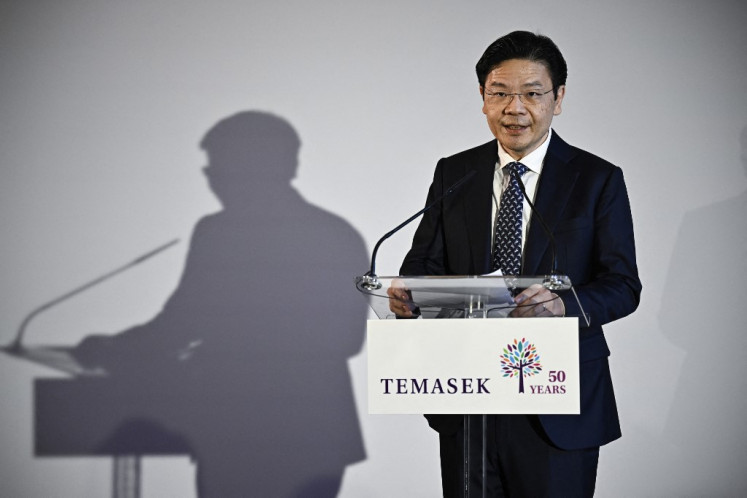Fighting forward: Unlinking sexual orientation and professionalism
Workplace discrimination based on sexual orientation and gender identity is a real issue in 21st century Indonesia. Here are several people who have struggled in their careers because of their sexual orientation, including a former police officer who's fighting the system.
Change Size

T
ri Teguh Pujianto dreamt of being a policeman ever since he was in high school. Being in the national scouts troop at school gave his life direction and purpose. Getting into the police academy was the obvious next step.
He became a member of the National Police (Polri) in 2007 and was stationed in Semarang, Central Java. Driven by his sense of nationalism, Teguh did very well at work and even received an award from the president. Teguh was promoted to the rank of Brigadier before he turned 30, a relatively young age for the position. Life was good and his future looked bright.
Teguh’s future turned bleak on Valentine’s Day 2017, when he and his male partner were apprehended at the latter’s workplace. He was removed from his post under Pemberhentian Dengan Tidak Hormat (PDTH), or dishonorable discharge, condemning him for his sexual orientation.
“I just wanted to serve the country,” Teguh, now 31, told The Jakarta Post.
Norms and decency
Everything that followed happened very quickly. Teguh was initially accused of extortion and then of desertion, with the police’s internal investigators claiming that he had flown to Singapore on a duty day. He was then accused of sexually harassing his boyfriend.
None of the allegations were proven, and Teguh was finally charged with violating the National Police Professional Code of Ethics (KEPP), which also covers police conduct in the context of law, religion and society.
Although his sexual orientation was never explicitly stated as the reason for the charges against him, Teguh saw an obvious connection.
In a May 2019 interview with news portal Suara.com, public information head Brig. Gen. Dedi Prasetyo at the National Police headquarters in Jakarta said that under Article 19, paragraph 1 of National Police Law No. 2/2002, police officers must conduct themselves according to legal and religious norms. They must also behave in a manner based on “decency, morals and uphold human rights”.
"Thus, it is implied that members of the National Police must not be LGBT or have sexual disorders or disorientation,” he said as quoted by Suara.com.
Similar cases have occurred elsewhere with worrying regularity. The military courts in Semarang, Jayapura, Bandung, Surabaya and Medan revealed that they had internal cases that involved homosexual officers, all of whom were fired and in some cases, jailed.
The Post spoke with several Army personnel on the matter, but they all declined to go on the record, citing reasons such as protecting their dignity or that their families had forbidden them from discussing the issue.
Not an isolated case
Rana, a 28-year-old associate producer at VICE Asia, told of how a national media company cut her from their list of job applicants because of her identity as a transwoman.
"I passed the three exam stages. In the final one-on-one interview, I told them I was a transwoman,” Rana recalled, and that the recruiter immediately “scratched” her name off the list of applicants in response.
The Post has tried to contact the company for verification.
In many cases, these discriminatory practices tend to occur in a relatively informal manner but are no less upsetting, and leave those on the receiving end feeling unsafe.
Azarine Kyle “Rinta” Arinta, who bills herself “a queer 28-year-old”, graduated university in 2014 and started a job at a nongovernmental organization a few months later.
"I felt that there was a possibility [I might] be treated differently if I showed my true self," Rinta said. But her hope were dashed. "There were inappropriate jokes, even homophobic jokes, thrown around the office. When I noticed that, I [realized] that place was not a safe space. So I quit."
Rinta then joined a company that practiced inclusiveness, where she said she was able to “embrace my identity” and start speaking up more about gender and identity issues.
“I learned that gender identity has nothing to do with professionalism," she said.
Employers’ perspective
Redi (not his real name) heads the media division in a well-known association for youth entrepreneurs. He said his peers demonstrated relative indifference toward LGBTQ colleagues, and that the workplace environment neither opposed nor supported them.
According to a 2020 survey by Pew Research Center, only 9 percent of the population in Muslim-majority Indonesia accepts homosexuality.
Redi thinks the system makes it hard for LGBTQ people to exercise their rights in the workplace. This was not always because of personal prejudice or religious views, but also because of the business mindset in decision-making.
"Entrepreneurs like to play it safe. They prefer not to talk so they don't offend anyone. If they publicly support LGBTQ [people], they are worried that people who do not support LGBTQ [people] won't buy their products," he said.
Sociologist Amika Wardhana at Yogyakarta State University noted that Indonesians tended to protect collective values as opposed to protecting individual rights when it came to societal norms.
“We are more of a 'mechanical' society. We expect other people to have the same religion, opinion and, of course, sexual orientation,” Amika told the Post.
Hope for justice
As for Teguh, he hasn’t backed down and is fighting to be reinstated in the police force, taking his case to the Semarang State Administrative Court. He argues that sexual orientation had nothing to do with professional capabilities.
“I worked there for ten good years and never made mistakes. This was my first [time], but I was fired immediately. Why didn’t they value those ten good years?” said Teguh, who now runs a barbershop.
Aisya Humaida of the Community Legal Aid Institute (LBHM) is representing Teguh, along with her colleague Ma’ruf. She told the Post they had attempted to file a lawsuit on his behalf on two separate occasions, but it was rejected both times.
The first attempt was in 2019, when the Semarang court cited the need for an internal police investigation as its reason for rejecting the suit outright.
“But how could that happen? The dishonorable discharge in November 2018 was already the final [decision] of that internal investigation,” said Aisya.
Their second attempt was just last year, when the Semarang court accepted the lawsuit for review. At the preliminary hearing, Teguh’s legal team invited the testimony of three experts on human rights and psychology, who told the judges that sexual orientation had no connection to professional ethics.
But the court rejected Teguh’s lawsuit, primarily because the statute of limitations had expired.
Teguh and his LBHM attorneys are trying one final time. This January, they submitted his lawsuit to the Surabaya State Administrative High Court and are still waiting for the court’s decision on whether the suit can proceed.
“The hope is not to let minorities like myself be discriminated against. I hope my other [LGBT] friends speak up and take a stand. We can’t be crushed, we can’t be bullied by the system,” stressed Teguh.









